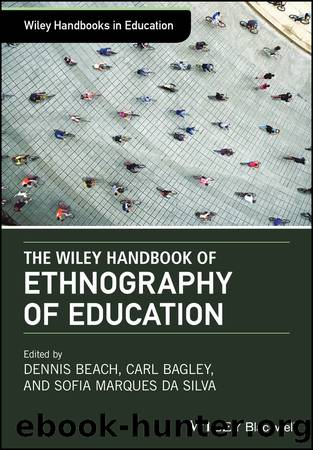The Wiley Handbook of Ethnography of Education by unknow

Author:unknow
Language: eng
Format: epub
ISBN: 9781118933725
Publisher: John Wiley & Sons, Inc.
Published: 2018-04-23T00:00:00+00:00
Notes
1 Although we have read extensively, we are aware that we selected the reading. We tried to focus on key texts in the Anglo‐Saxon area to open up our focus later more broadly on German and Swiss studies with the aim of figuring out connections between the two different language regions. We are aware of missing a lot of important studies with our selection. Thus, we do not want to make a claim of being exhaustive in our reading of the tremendous and still growing field and we don’t claim to represent the one and only history of a German and Swiss tradition of educational ethnography.
2 Because of this, there cannot be a clean break between the disciplines within the discussion on educational ethnography. It is and always will be a fuzzy and blurred topic.
3 A remark on the term “Anglo‐Saxon”: We focus in the following part on what we call Anglo‐Saxon from a continental European perspective. We refer to the UK and the USA, sometimes to the English‐speaking part of Canada. We leave out countries like Australia, New Zealand, or India because it would reach beyond the purpose of this article. As Anderson‐Levitt (2012a: 8) pointed out, the label “Anglo‐Saxon” can shock authors from within. If this is the case, we apologise.
4 We do not aim to unveil all the details about the two traditions; for this, we refer to the following articles: Delamont and Atkinson (1980), Delamont (2011), Eisenhart (2001, 2014), Levinson et al. (2000), DeMarrais, Armstrong, and Preissle (2011), Weis et al. (2011), and Hammersley (2012).
5 This is also discussed in other chapters in the present volume, such as those by Eisenhart or Maeder.
6 http://www.ethnographyandeducation.org/.
7 Astonishingly, in the case of Jackson, who was a trained psychologist and worked in the field of education and curriculum studies throughout his entire career.
8 The terms are not used as synonyms. The disciplinary development from pedagogy to modern educational science is outlined in Lenzen (1995).
9 Zinnecker (1995) and Marotzki (1998) later argued for a specific “pedagogical ethnography.” This attempt was, and still is, contested in many ways (cf. Lüders 2006; Bollig and Neumann 2011: 201).
10 Not considered in this account are the connections between biographical research and ethnography (see Dausien and Kelle 2005; Lüders 2006).
11 The common term in Germany (Wulf 2015). For a short overview, see also Anderson‐Levitt (2012b).
12 Interestingly, Wulf criticizes the American anthropology of education and describes it as a too narrowly focused tradition, which reduces itself to “ethnographic fieldwork and the study of alterity” (2015: 7).
13 They identify key directives such as investigating the accomplishment of the lived order (the “doings”), not imposing any concept or category a priori, maintaining a posture of indifference to the value of members’ methods, making the familiar strange, the interest in tacit knowledge, and so forth. Those ideas and directives are extremely resonant within the German methodological discussion of educational ethnography.
14 This quote seems to apply to the American rather than the British context.
15 And praxis theory seems to be discussed in an altogether different context, as in Carspecken (2002).
Download
This site does not store any files on its server. We only index and link to content provided by other sites. Please contact the content providers to delete copyright contents if any and email us, we'll remove relevant links or contents immediately.
| Anthropology | Archaeology |
| Philosophy | Politics & Government |
| Social Sciences | Sociology |
| Women's Studies |
The Leavers by Lisa Ko(6473)
Born to Run: by Christopher McDougall(6260)
iGen by Jean M. Twenge(4702)
Sapiens by Yuval Noah Harari(4537)
The Kite Runner by Khaled Hosseini(4435)
Spare by Prince Harry The Duke of Sussex(4198)
Bullshit Jobs by David Graeber(3180)
Livewired by David Eagleman(3122)
Goodbye Paradise(2963)
Never by Ken Follett(2880)
A Dictionary of Sociology by Unknown(2518)
Harry Potter 4 - Harry Potter and The Goblet of Fire by J.K.Rowling(2416)
The Club by A.L. Brooks(2360)
People of the Earth: An Introduction to World Prehistory by Dr. Brian Fagan & Nadia Durrani(2346)
The Social Psychology of Inequality by Unknown(2311)
Machine Learning at Scale with H2O by Gregory Keys | David Whiting(2291)
Harry Potter and the Order of the Phoenix (5) by J.K. Rowling(2227)
0041152001443424520 .pdf by Unknown(2220)
Don't Sleep, There Are Snakes by Daniel L. Everett(2217)
